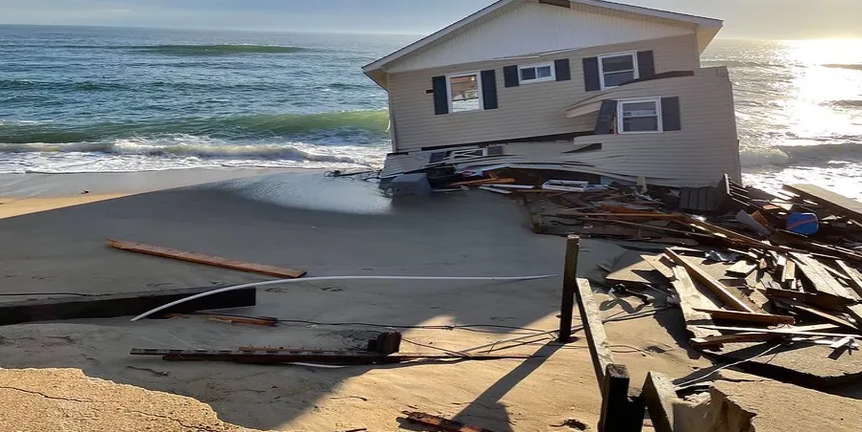Weather Patterns and Rising Sea Levels Contribute to the Dramatic Collapse of Rodanthe Beach House Amidst Philadelphia Weather Concerns
Introduction: The Collapse That Shocked Rodanthe
A beach house in Rodanthe, NC, collapsed into the Atlantic Ocean, marking the seventh such incident in four years in the Outer Banks. This dramatic event highlights the ongoing challenges faced by coastal communities, particularly those in Rodanthe, as they grapple with the effects of weather patterns, coastal erosion, and rising sea levels. The recent collapse has reignited discussions on the sustainability of beachfront living, especially as weather patterns become increasingly erratic.
Discover more articles on USA Elects
Rodanthe NC House Collapse – A Sign of the Times
The collapse of the Rodanthe house is more than just a tragic loss for the property owners; it is a stark reminder of the growing vulnerability of coastal properties. Located on the iconic Outer Banks, Rodanthe is known for its picturesque beaches and vacation homes. However, these idyllic settings are increasingly under threat as coastal erosion and severe weather patterns become more frequent.
The recent Rodanthe house collapse, which occurred on August 16, is a chilling reminder of these threats. The home, perched precariously on the edge of the shoreline, could not withstand the relentless forces of nature. As the pilings supporting the structure weakened, the house leaned and ultimately succumbed to the powerful ocean waves.
Weather Patterns from Philadelphia to Rodanthe – A Shared Concern
While the Rodanthe collapse is a local issue, it resonates with broader concerns about weather patterns affecting communities far beyond the Outer Banks. Philadelphia, for instance, has experienced its own share of unusual weather this year, with erratic temperature swings and increased storm activity. These weather patterns, while seemingly unrelated, are part of a larger trend of climate change impacting diverse regions.
The link between Philadelphia weather and coastal events like the Rodanthe house collapse lies in the broader understanding of climate dynamics. Warmer temperatures, shifting jet streams, and rising sea levels all contribute to the increasingly volatile weather patterns. These changes not only affect urban centers like Philadelphia but also exacerbate coastal erosion in places like Rodanthe, leading to more frequent and severe incidents.
The Impact on the Outer Banks – A Fragile Environment
The Outer Banks, including the community of Rodanthe, is an area particularly susceptible to the effects of coastal erosion. The dynamic nature of barrier islands means that they are constantly shifting, with sand being moved by wind, waves, and currents. However, human activities, such as construction and development, have accelerated these natural processes, making areas like Rodanthe more vulnerable.
In the case of the Rodanthe house that collapsed, experts point to a combination of factors: the ongoing erosion of the beach, which was worsened by recent weather events, and the rising sea levels driven by climate change. As these forces continue to intensify, the question of how to protect properties and communities in the Outer Banks becomes increasingly urgent.
Table: Contributing Factors to Coastal Erosion in Rodanthe
| Contributing Factor | Impact on Coastal Erosion | Example in Rodanthe NC |
|---|---|---|
| Rising Sea Levels | Increases erosion rates | Submergence of coastal areas |
| Severe Weather Patterns | Accelerates erosion | Hurricane swells damaging structures |
| Human Development | Disrupts natural processes | Construction near shorelines |
| Coastal Erosion | Loss of land and property | Recent house collapse |
The Path Forward – Protecting Rodanthe and Similar Communities
As the Rodanthe house collapse highlights, there is an urgent need to address the challenges posed by coastal erosion and severe weather. For communities in the Outer Banks, this means reevaluating development practices and implementing more robust coastal management strategies. Potential solutions include beach nourishment projects, which involve adding sand to eroding beaches, and the construction of sea walls to protect against rising waters.
Furthermore, it is essential for policymakers to consider the long-term impacts of climate change on coastal regions. This includes planning for sea-level rise and extreme weather events that could become more common in the future.
Conclusion: Learning from Rodanthe’s Loss
The collapse of the Rodanthe house serves as a powerful reminder of the fragility of coastal communities in the face of natural forces. While the immediate focus is on addressing the debris and hazards left by the collapse, the broader conversation must be about how to protect these communities in the long term.
As weather patterns continue to evolve, from Philadelphia to Rodanthe, it is clear that we must adapt to the changing climate. By taking proactive measures to mitigate the impacts of coastal erosion and severe weather, we can help ensure that the beauty and vitality of the Outer Banks, and similar communities, are preserved for future generations.
Call to Action:
Stay informed and engaged in efforts to protect our coastal communities. Follow updates on weather patterns and climate change, and consider supporting initiatives aimed at preserving vulnerable regions like the Outer Banks.

